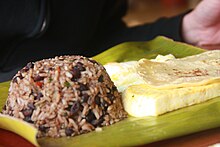Gallo pinto

Gallo pinto, served at breakfast with egg, cheese and a tortilla
|
|
| Alternative names | Casamiento, casado (El Salvador, Honduras, parts of Nicaragua, and Guatemala), pispiote (Mexico) |
|---|---|
| Course | Breakfast and Dinner |
| Place of origin | Nicaragua |
| Region or state | Central America |
| Serving temperature | Hot |
| Main ingredients | Rice and beans |
| Variations | Different kinds of meat or fish possible |
| 4000 kcal (16747 kJ) | |
| |
|
Gallo pinto or gallopinto is a traditional dish of Costa Rica and Nicaragua made with rice and black beans. Beans are quickly cooked until the juice is almost consumed.
The history of gallo pinto is not well known, and there are disputes between Costa Ricans and Nicaraguans about where the dish originated. One theory suggests that gallo pinto was brought into Latin America by African slaves that migrated into Latin America . Most Latin Americans agree that the dish is part of both countries now.
Gallo pinto means "spotted rooster" in Spanish. The name is said to originate in the multi-colored or speckled appearance that results from cooking the rice together with black or red beans.
There are other variations of this dish. Similar dishes are known as Moros y Cristianos ("Moors and Christians") in Spain and Cuba, or just Moro. A similar dish can be found in Panama, Honduras, and in El Salvador, where it is called casados or casamiento. In the caribbean north coast of Honduras the dish is prepared using coconut milk, coriander and sometimes adding deep fried pork belly fat or Chicharrones and it is called "Rice and Beans" even in Spanish, since it was introduced to the Honduran cuisine in the northern islands of the country where the population speaks mostly English.
Variations of gallo pinto are popular in many countries close to the Caribbean.. Variations include using pigeon peas, kidney beans, or black beans in the Dominican Republic and Puerto Rico along with coconut milk in Puerto Rico and arroz mamposteao is another similar dish in Puerto Rico. Similar dishes exist in Colombia (calentado paisa) and even Peru (tacu tacu).
...
Wikipedia
